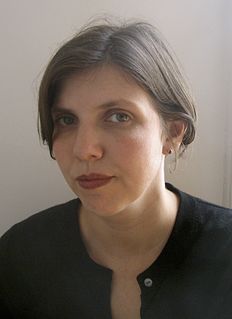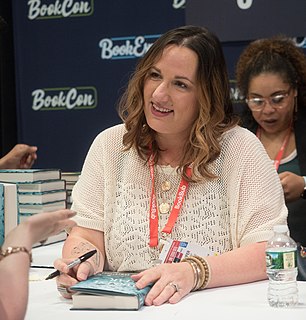A Quote by Jenny Offill
I had written a novel that was more of a classic linear novel, and I worked on it and worked on it for years, and it always seemed like it wouldn't catch fire. At a certain point I just scrapped it all, and I kept maybe 15 percent of it, and I wrote those parts out on note cards.
Related Quotes
When I was fifteen I wrote seven hundred pages of an incredibly bad novel - it's a very funny book I still like a lot. Then, when I was nineteen I wrote a couple hundred pages of another novel, which wasn't very good either. I was still determined to be a writer. And since I was a writer, and here I was twenty-nine years old and I wasn't a very good poet and I wasn't a very good novelist, I thought I would try writing a play, which seems to have worked out a little better.
When you go through life ... it all seems accidental at the time it is happening. Then when you get on in your 60s or 70s and look back, your life looks like a well-planned novel with a coherent theme ... Incidents that seemed accidental, pure chance, turn out to be major elements in the structuring of this novel. Schopenhauer says, 'Who wrote this novel? You did.'
I was a lot dumber when I was writing the novel. I felt like worse of a writer because I wrote many of the short stories in one sitting or over maybe three days, and they didn't change that much. There weren't many, many drafts. That made me feel semi-brilliant and part of a magical process. Writing the novel wasn't like that. I would come home every day from my office and say, "Well, I still really like the story, I just wish it was better written." At that point, I didn't realize I was writing a first draft. And the first draft was the hardest part.
I used to feel for years and years and years that I was very remiss not to have written a novel and I would question people who wrote novels and try to find out how they did it and how they had got past page 30. Then, with the approach of old age, I began to just think: “Well, lucky I can do anything at all.
In the case of my second film The Fish Child (El Niño Pez), I had written the novel about 5 years before I made into a film. In the case of The German Doctor I had published the novel a year before I started writing the script, I even had another project to shoot. But I had this idea of the powerful cinematic language from the novel that I couldn't let go of.
I finished my first novel - it was around 300 pages long - when I was 16. Wrote one more before I got out of high school, then wrote the first Lincoln Perry novel when I was 19. It didn't sell, but I liked the character and I knew the world so I tried what was, in my mind, a sequel. Wrote that when I was 20, and that one made it.
It's very bad to write a novel by act of will. I can do a book of nonfiction work that way - just sign the contract and do the book because, provided the topic has some meaning for me, I know I can do it. But a novel is different. A novel is more like falling in love. You don't say, 'I'm going to fall in love next Tuesday, I'm going to begin my novel.' The novel has to come to you. It has to feel just like love.







































